Joining a caregiver support group offers emotional relief, practical advice, and a sense of community that can ease your stress. You’ll find peers who understand your challenges and share helpful tips for managing daily tasks. These groups provide a safe space to share your feelings and learn new skills. By participating actively, you’ll build confidence and resilience. Keep exploring, and you’ll discover how to find the right group and make the most of this valuable support.
Key Takeaways
- Support groups provide emotional connection, reducing loneliness and fostering resilience through shared experiences.
- They offer practical caregiving tips on medication management, organization, and communication strategies.
- Find suitable groups by identifying your needs, exploring local resources, and verifying facilitator backgrounds.
- Join via in-person, online, or hybrid formats, ensuring the environment matches your comfort and schedule.
- Engage actively and regularly to build a support network, gain insights, and enhance caregiving confidence.
Understanding What Caregiver Support Groups Are
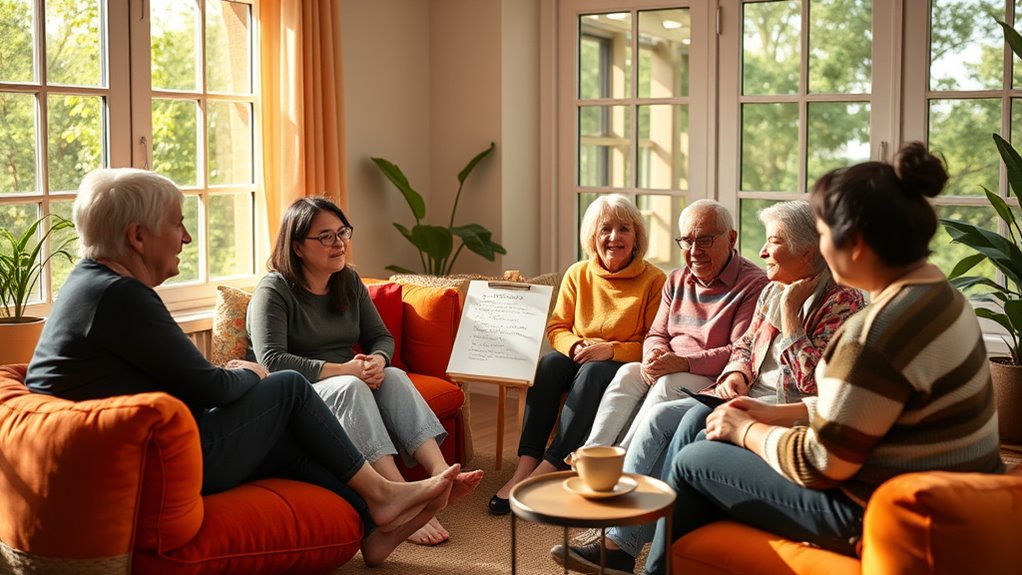
Caregiver support groups are organized gatherings where people caring for loved ones with health conditions come together to share experiences and advice. These groups provide a space for caregivers to receive emotional support and practical caregiving tips. In some states, like Georgia, caregivers can also turn to mediation services to help navigate disputes related to caregiving responsibilities.
Whether in person, online, or via phone, support groups offer flexible options to fit your schedule. Facilitated by trained professionals or peer leaders, these groups encourage shared experiences and peer support, helping you feel less isolated. Additionally, many caregivers find that sharing their stories and challenges leads to discovering unique dog names that resonate with their personal experiences. Support groups also allow caregivers to learn about cookie consent preferences that can help them manage their digital interactions and resources more effectively. Moreover, participants often share insights about beneficial nutrients that can enhance the overall well-being of both caregivers and those they care for.
They also serve as valuable resources for education and resource sharing, strengthening your coping skills. By participating, you connect with others who understand your challenges, gaining confidence and guidance to navigate caregiving more effectively. Color accuracy is one important aspect to consider when selecting tools to enhance your caregiving environment.
Support groups are a valuable tool for improving your well-being and caregiving journey.
Exploring the Advantages of Joining a Support Group
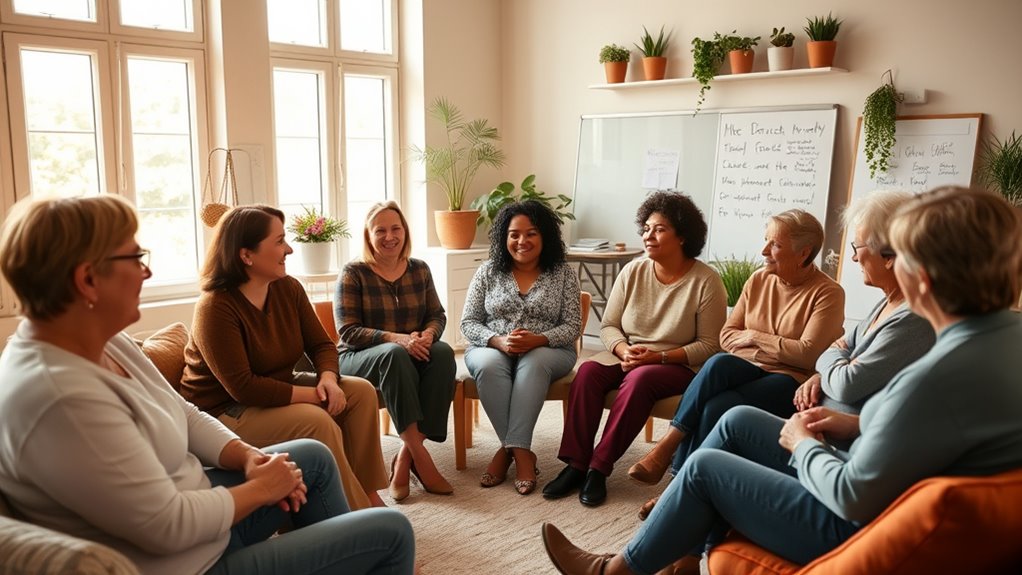
Joining a caregiver support group can provide you with emotional support and a sense of connection to others who understand your experiences. You’ll also gain practical advice and strategies to handle daily caregiving tasks more confidently. This sense of community can boost your mental well-being and help you manage stress more effectively. Additionally, sharing your experiences in a group can inspire you to explore creative display options that enhance your caregiving environment. Engaging with others can also remind you of the importance of nutritional health for maintaining your own well-being as a caregiver. Furthermore, the collaborative efforts within these groups can lead to social change initiatives that benefit the caregiver community as a whole. Participating in these groups can also enhance your understanding of the importance of emotional expression in coping with stress. Additionally, discussing self-care practices like using eye patches can help you maintain your appearance and boost your confidence as a caregiver.
Emotional Connection and Support
Being part of a support group creates a safe space where you can openly share your feelings and experiences, which helps reduce feelings of isolation and loneliness. This environment provides essential emotional support, allowing you to feel validated and understood through shared stories and experiences from peers. Additionally, support groups often provide reliable resources that can help guide new parents through their challenges. For example, many groups share strategies for emotional well-being that can help caregivers manage their stress effectively.
Moreover, engaging in activities like mindfulness practices can enhance your overall emotional resilience and reduce anxiety during challenging times.
As you connect with others who truly comprehend your situation, you’ll develop a sense of belonging and empathy, strengthening your emotional resilience. These peer connections foster a sense of community that encourages encouragement and understanding, improving your mental well-being. Regular involvement can also offer stress relief, helping you manage the emotional burden of caregiving. Additionally, engaging in a support group may help you learn valuable caregiving strategies that can enhance your ability to cope.
Ultimately, joining a support group helps you build meaningful relationships that provide ongoing emotional connection and support, crucial for steering your caregiving journey. Additionally, engaging in this community can enhance your overall mental well-being by promoting emotional support from others who share similar experiences.
Practical Caregiving Strategies
Participating in a support group not only offers emotional comfort but also provides practical caregiving strategies that can make daily tasks more manageable. You’ll gain caregiving tips on medication management, organization, and communicating effectively with healthcare providers. Engaging in mindful decluttering strategies can also help you create a more organized environment, which is essential for effective caregiving. Additionally, utilizing tableware for meal preparation and serving can streamline mealtime routines and enhance the dining experience for care recipients. Incorporating natural materials into your caregiving environment can also contribute to a calming atmosphere. Furthermore, understanding cost of living adjustments can help you plan for the long-term financial implications of caregiving.
Sharing experiences allows you to learn caregiving skills like bathing, dressing, and mobility assistance with confidence. Support group advice often includes orienting yourself within local respite services and enlisting family support to ease your responsibilities.
Additionally, you’ll discover time management techniques and tech tools for managing appointments and medical records. Peer support offers practical problem-solving strategies to handle common challenges, reducing stress and boosting your caregiving routines. This collaborative environment can also enhance dynamic communication exercises that improve interactions with both caregivers and care recipients.
- Gaining confidence through shared caregiving techniques
- Learning time-saving tools for daily management
- Accessing support for effective communication with healthcare providers
What to Expect From Support Group Sessions

Support group sessions typically involve guided discussions led by facilitators who focus on topics like stress management, caregiving skills, and problem-solving. During these sessions, you’ll find a safe, confidential environment where peer sharing is encouraged, allowing you to openly express feelings and experiences. With financial stability being crucial for caregivers, understanding credit card insights can help manage expenses related to caregiving. Notably, the Bollywood legends have often depicted the emotional journeys of caregivers in their films, showcasing the impact and importance of support systems. Additionally, learning about self-watering plant pots can provide caregivers with low-maintenance options for indoor plants, contributing to a calming environment. Furthermore, participating in workshops and classes can enhance your caregiving skills and boost your confidence in managing challenges.
Sessions often include educational components to enhance your caregiving knowledge and practical skills. Facilitators may provide professional guidance or coordinate Q&A segments to address specific concerns. Additionally, diverse camping locations can serve as a unique way to recharge and find balance amidst caregiving responsibilities.
Support groups can meet in person, virtually via video calls, or over the phone, offering flexibility to fit your schedule. With regular attendance—weekly or monthly—you gain ongoing support and a sense of community, making these sessions a valuable resource for steering caregiving challenges.
Tips for Finding the Right Support Group for You
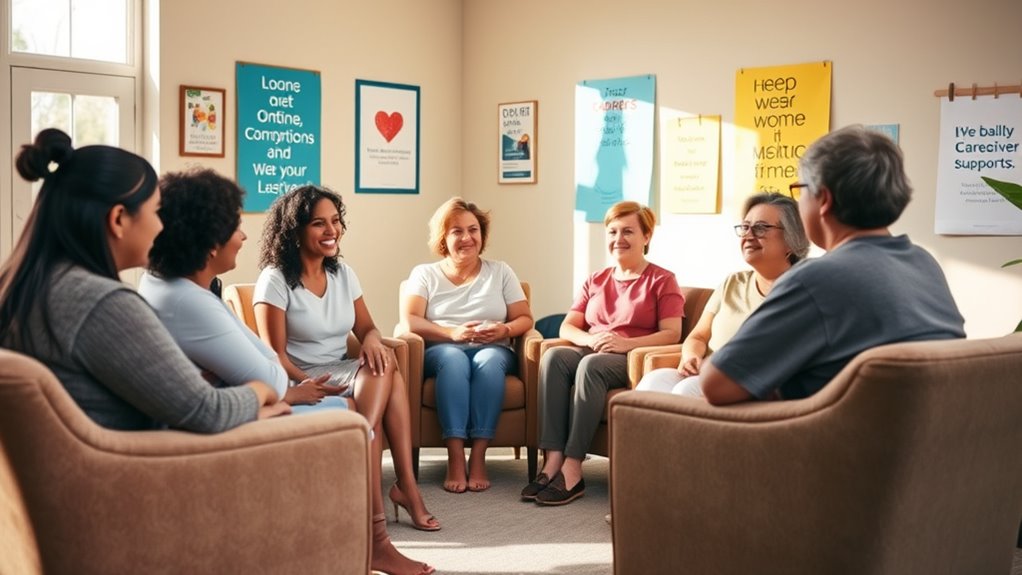
Start by identifying what you need most from a support group, like specific conditions or a preferred setting.
Then, explore local resources and online options to find matches that fit your schedule and comfort level.
Don’t forget to verify facilitator backgrounds and ask questions to guarantee the group aligns with your goals.
Identify Your Needs
To find the right support group, begin by evaluating your specific caregiving situation, including the health condition involved. This assessment helps you identify your caregiving needs and find groups tailored to those needs.
Think about what kind of support you’re seeking—whether emotional, practical, or informational—and choose a group that offers personalized support.
Research resources like online directories or recommendations from healthcare professionals to narrow your options.
Focus on groups that match your needs through their group focus, facilitator background, and demographic makeup.
Remember, the goal is to find a support group where you feel understood and supported.
Taking the time to assess your needs ensures you connect with caregiver support that truly helps you navigate your journey.
Explore Local Resources
Once you’ve identified your caregiving needs, the next step is to explore local resources that can connect you with suitable support groups. Check with community centers, hospitals, and social service agencies—they often host or promote caregiver support groups. Use online directories like the Alzheimer’s Association, AARP, or the National Alliance for Caregiving to find condition-specific groups nearby. Also, look for announcements on social media platforms and community bulletin boards for upcoming sessions, both in-person and virtual. Reach out to mental health clinics or organizations through partnerships with local healthcare providers for personalized recommendations. Here’s a quick overview:
| Resource Type | How It Helps |
|---|---|
| Community Centers | Host local caregiver support groups |
| Online Directories | Find condition-specific or general caregiver groups |
| Hospitals & Clinics | Offer support referrals and programs |
| Social Service Agencies | Provide personalized support options and info |
Steps to Get Started With a Support Group
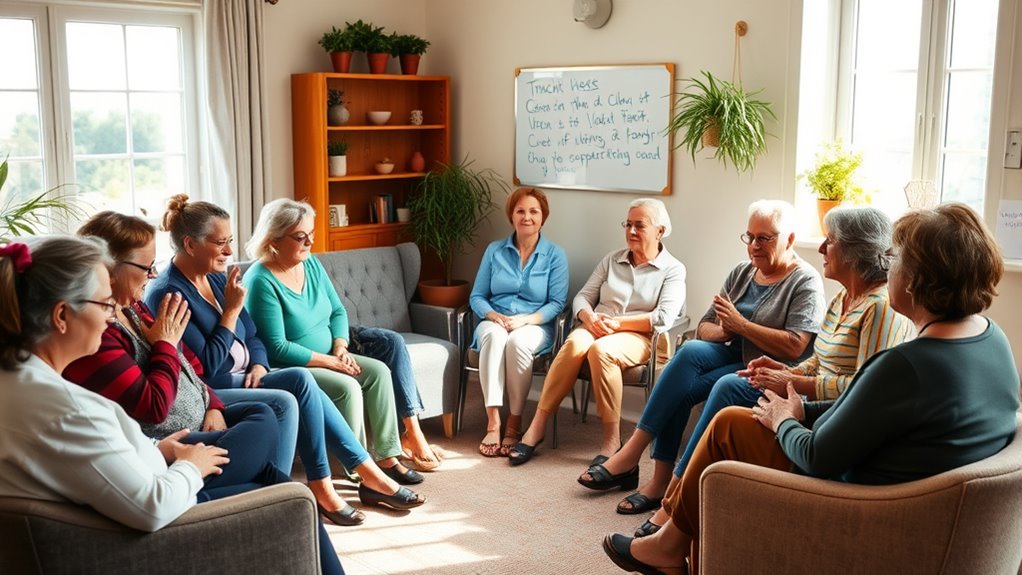
Finding the right caregiver support group begins with some research. Start by exploring local organizations, hospitals, or community centers that offer support groups for caregivers.
Begin your caregiver support journey by researching local groups and resources in your community.
Decide whether you prefer in-person, virtual, or hybrid meetings based on your schedule, mobility, and comfort level.
Consider the focus of the support group—whether it’s about specific health conditions or emotional support—to find the best fit for your needs.
Contact facilitators or coordinators to ask about confidentiality policies, group structure, and whether the group is led by professionals or peers.
Be sure to complete registration or sign-up early, as many support groups have limited spaces and require advance enrollment to secure your spot.
- Feel confident knowing you’re taking the first step toward support.
- Find comfort in shared understanding and connection.
- Empower yourself to navigate caregiving with support.
Making the Most of Your Support Group Experience
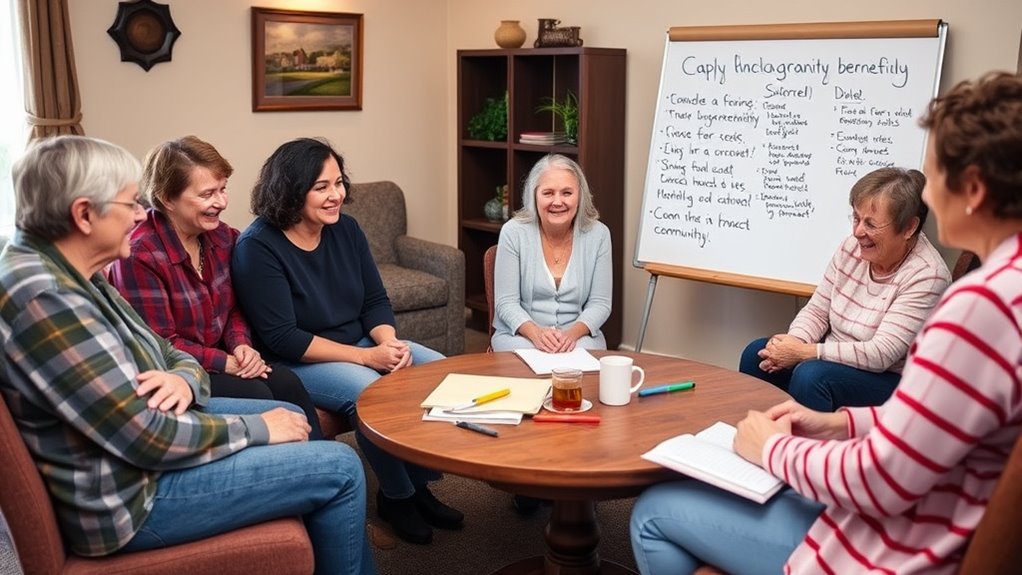
Participating actively in your support group can considerably enhance the benefits you receive. Engage fully by sharing your experiences and participating in discussions; this deepens your connection to the group and fosters trust.
Regular attendance helps build a reliable support network and strengthens relationships with diverse members, offering fresh perspectives and practical tips to improve your caregiving.
Take advantage of online platforms and webinars to access resources and connect flexibly outside in-person meetings.
After each session, reflect on your emotional needs to determine if the group continues to support your growth and well-being.
Being intentional about your participation ensures you gain meaningful insights, emotional support, and new strategies, making your support group experience more fulfilling and effective.
Frequently Asked Questions
What Are the Benefits of Joining a Peer Support Group?
You gain emotional validation and reduce loneliness by joining a peer support group. It allows you to share practical advice and coping strategies, which improve your caregiving skills.
Being part of a community boosts your mental well-being and builds confidence through shared experiences. Regular participation creates a dependable support network that eases stress and prevents burnout, helping you feel more empowered and connected in your caregiving journey.
How Do I Join a Support Group?
To join a support group, start by researching local healthcare providers, community centers, or organizations like the Alzheimer’s Association or CancerCare.
Contact them via phone, email, or their website to ask about meeting times, locations, and registration steps.
Keep in mind, early registration is recommended since spaces can fill quickly.
Most groups prioritize confidentiality, and trained facilitators create a safe environment for sharing personal experiences.
How Much Can a Family Member Get Paid to Be a Caregiver?
You might think family caregiving isn’t paid, but it can be, depending on where you live. Some programs offer direct payments or stipends, ranging from a few hundred to several thousand dollars monthly, based on care needs and eligibility.
Your specific amount depends on your state’s rules, income, and assessment. So, check local Medicaid or state programs to see what financial support you might qualify for as a family caregiver.
What Is the Purpose of a Caregiver Support Group?
A caregiver support group exists to give you a safe space to share your experiences, feelings, and challenges. It’s designed to offer emotional support, lessen feelings of isolation, and build a sense of community with others who understand your situation.
These groups also provide helpful information on caregiving techniques, healthcare resources, and stress management, empowering you to improve your well-being and the quality of care you provide.
Conclusion
Joining a caregiver support group is like planting a sturdy tree in your life’s garden—offering shade, strength, and new growth. It’s a safe space where you can share your journey and find nourishment for your soul. Embrace the connections, soak in the wisdom, and watch your confidence blossom. With each step, you’ll build a sanctuary of support and understanding, turning your caregiving path into a journey of resilience and renewal.









